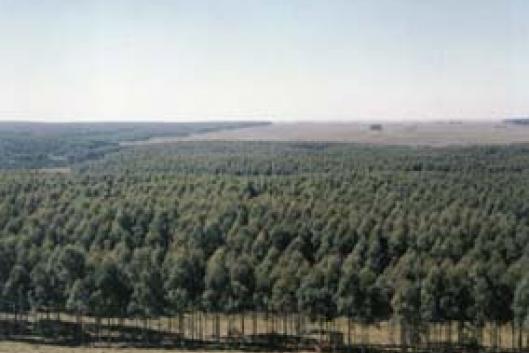Declaration by the Latin American Network Against Monoculture Tree Plantations
September 21, 2012
Industrial tree plantations have reportedly quadrupled in surface area over the last two decades worldwide. This expansion has been particularly notable in the Global South, causing forced displacement, water crises, unrecoverable loss of fertile soils, desertification and extinction of other ways of relating to nature. Yet none of these phenomena are assessed or even taken into consideration by the authorities who continue to champion the predatory advantages of green extractivism.
In fact, the environmental crisis and climate change in recent years has led transnational corporations, governments of the North, and even the United Nations, to promote a series of false solutions, including the use of agrofuels, as supposed sources of renewable energy.
The European Union is a key advocate of the use of agrofuels and, increasingly, of wood biomass for energy, as one “solution” to the current climate crisis. Estimates show that the demand generated by the European Union alone would imply that the volume of wood needed to produce energy would go from 346 million cubic meters in 2010 to 573 million by 2020, and 752 million by 2030 (1).
In Latin America, the expansion of tree plantations is linked to a process of land grabbing and an appalling, ever-widening gap between rich and poor. And despite the declarations of good intentions put forth at summits like Rio+20, we are now faced with a new stage of expansion tied to the production of crops needed to supply the excessive energy demands of the North.
In Argentina, press reports have already begun to circulate highlighting the potential of large scale tree plantations available for energy production in the Province of Corrientes. In Brazil, the pulp and paper company Suzano, through a new affiliate called Suzano Energia Renovável, intends to invest 1.3 billion dollars in biomass plantations in the Baixo Parnaíba region in Maranhão in order to supply energy to a power station in the UK. The Ecuadorian government likewise wants to turn the country into a “forestry power” with its tree plantations incentive plan and an initial investment of 240 million dollars to plant trees on 120,000 new hectares of land for wood production. President Rafael Correa has declared that this investment “has no ceiling.”
Oil palm plantations are also being promoted in numerous Central American countries like Nicaragua, Guatemala, Honduras and México, in addition to Perú, Colombia and Ecuador. Honduras, for example, now has 200,000 hectares of oil palm plantations and an estimated expansion to a half million in surface area. It was likewise recently reported that Malaysian transnational giant, Sime Darby, is awaiting authorization from the Peruvian government to establish a 70,000 hectares of oil palm plantation directly in the Peruvian Amazon. Although it is hard to trace the final destination of the oil currently produced or that will be produced, estimates show that the demand for biofuels will increase exponentially, mainly in the European Union due to their incentive policies to replace fossil fuels with the use of supposedly green fuels.
The impacts of monoculture plantations are widely known by the communities who witness the occupation of their territories: deforestation, forced displacement, human rights violations, depletion and destruction of water sources, loss of food sovereignty… and the list goes on.
Counter to this culture of death, however, there are more and more citizens, organizations, networks and movements saying “Enough!” We condemn the social and environmental impacts of these monoculture crops and stand against the expansion of a model that results in the destruction of our habitats, our culture and our community values.
This September 21st, we commemorate International Day Against Monoculture Tree Plantations and join together to celebrate the resistance struggle. RECOMA raises the alarm and condemns industrial monoculture tree plantations for energy purposes, which only deepen injustice.
‘YES’ to life, to biodiversity and to local communities staying on their land.
‘NO’ to the expansion of industrial monoculture tree plantations!
1 - “An overview of industrial tree plantations in the global South. Conflicts, trends and resistance struggles.” WRM and EJOLT, 2012. Available at www.ejolt.org/2012/06/an-overview-of-industrial-tree-plantations-in-the-global-south-conflicts-trends-and-resistance-struggles/
